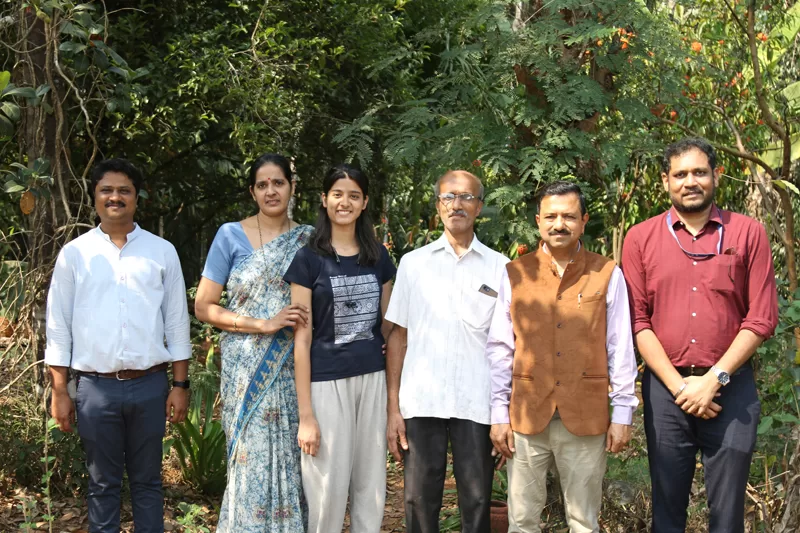


Sanjay Anant Patil has been recognized for his groundbreaking work in natural farming and zero-energy micro-irrigation systems, earning him the Padma Shri Award in 2024. He transformed a barren plot of land in his village of Savoi Verem into a flourishing natural farm and areca nut farm. Patil's passion for farming began during his childhood, where he learned the trade from his uncle in Shiroda, 20 km away from his village. Despite leaving his job to pursue natural farming, Patil's hard work and dedication have paid off, as he continues to spread awareness and produce various crops through sustainable methods.
Padma Shri Award 2024: Sanjay Anant Patil Honored for Advancements in Natural Farming
Sanjay Anant Patil, a visionary farmer from Goa, has been bestowed with the prestigious Padma Shri Award in recognition of his pioneering contributions to natural farming and zero-energy micro-irrigation systems.
Background
Born into a farming family in the village of Savoi Verem, Goa, Patil's passion for agriculture was ignited at a young age. After leaving his job to pursue his dream, he embarked on a journey to transform a barren plot of land into a flourishing natural farm and areca nut plantation.
Driven by the belief that chemical-free farming is essential for the health of both humans and the environment, Patil embraced a holistic approach to agriculture. He implemented innovative practices such as:
Zero-Energy Micro-Irrigation Systems
In addition to his work in natural farming, Patil developed innovative zero-energy micro-irrigation systems that utilize gravity to deliver water to crops. These systems drastically reduce energy consumption and improve water efficiency, making them particularly beneficial for small-scale farmers in water-scarce areas.
Impact
Patil's pioneering efforts have had a profound impact on the farming community in Goa and beyond. He has trained thousands of farmers in natural farming techniques, empowering them to cultivate healthy and sustainable crops. His work has also drawn international recognition, with organizations such as the United Nations Environment Programme (UNEP) highlighting his contributions.
Top 5 FAQs
1. What is the Padma Shri Award? The Padma Shri is one of the highest civilian awards in India, recognizing distinguished contributions in various fields.
2. Why was Sanjay Anant Patil awarded the Padma Shri? Patil was awarded for his groundbreaking work in natural farming and zero-energy micro-irrigation systems.
3. What are the benefits of natural farming? Natural farming practices promote biodiversity, improve soil health, and reduce dependency on chemical fertilizers and pesticides.
4. How do zero-energy micro-irrigation systems work? These systems utilize gravity to deliver water to crops, eliminating the need for external energy sources such as pumps.
5. What are Patil's future plans? Patil plans to continue spreading awareness about natural farming and zero-energy micro-irrigation systems, mentoring young farmers and promoting sustainable agriculture practices.

Devotees from all over India flocked to Vishram Ghat in Mathura to participate in the annual Bhai Dooj festival, a celebration of the special bond between brothers and sisters. The ancient Yamraj Temple was the center of the festivities as devotees took a dip in the holy Yamuna River and performed rituals to honor Yamraj and Goddess Yamuna. The festival is believed to bring blessings of long life, happiness, and prosperity to siblings and is a symbol of love and protection in Hindu mythology.

On the auspicious occasion of Bhai Dooj, Prime Minister Narendra Modi, Union Home Minister Amit Shah, and Union Health Minister JP Nadda extended their heartfelt wishes to the nation, celebrating the sacred bond between brothers and sisters. This festival, also known as Bhaiya Dooj, Bhai Tika, or Bhau Beej, is widely celebrated across India with love and festivity, symbolizing the unbreakable affection and dedication between siblings. The day holds great significance in Hindu mythology and is associated with the liberation of all living beings from suffering and the bestowal of happiness.

On Wednesday, April 30, Hindus will celebrate the auspicious festival of Akshay Tritiya, also known as Akha Teej. This day is believed to bring luck and success, and is considered free from all malefic effects. People often buy gold on this day as it is believed to bring prosperity and wealth in the future. Akshay Tritiya is also considered to be ruled by Lord Vishnu, who is a revered deity in Hinduism. The best time to buy gold on this day is between 06:11 AM and 02:12 PM, according to Drik Panchang.

As Diwali comes to a close, the festival of Bhai Dooj celebrates the unconditional love and bond between brothers and sisters with various names across India. This year, Bhai Dooj falls on October 23, with the tilak ceremony auspicious time from 1:14 PM to 3:29 PM. It is a time to cherish the cherished memories and create stronger relationships between siblings. Share heartfelt wishes and blessings on this day to celebrate the beautiful bond of love and togetherness.

Marking a historic moment, President Droupadi Murmu offered prayers at the Sabarimala Temple in Kerala, becoming the first serving state head to do so. She climbed the 18 sacred steps to reach the shrine and offered darshan to Lord Ayyappa, carrying the sacred bundle on her head. This visit holds symbolic significance as the president represents both Vaishnavism and Shaivism, making it a moment of unity in Hinduism.

As Diwali celebrations come to an end, the day after is marked by the auspicious festival of Govardhan Puja or Annakut. In 2025, this festival falls on Wednesday, 22 October, and is a reminder to express gratitude towards nature and the environment. Devotees prepare special offerings and decorate their homes with flowers and diyas, honoring Lord Krishna and the bounty of nature. While the article provides general guidance, it also urges readers to consult experts before implementing any beliefs or practices discussed.

The Udupi Catholic diocese has extended warm Diwali greetings, citing the festival as a symbol of moving from darkness to light, falsehood to truth, and death to new life. The diocese emphasizes India's diversity and unity in celebrating different festivals together. Sharing a symbolic story, the diocese urges people to be the candle of hope that relights peace, faith, and love in the world. The message concludes with a call to action to be the light that builds bridges of love, faith, and compassion.

The Hindu Vikram Samvat calendar marks October 22, 2025, as Gujarati New Year, a day of renewal, positivity, and joy for devotees. From early morning prayers to temple visits, sweets, and sharing warm messages, the day is a festive symbol of hope and abundance. As it falls a day after Diwali, it's also a time to open new accounts, perform rituals like Chopda Puja, and spread love, gratitude, and togetherness with family and friends.

As Diwali celebrations come to an end, Mumbai is facing a major problem of poor air quality. The city is engulfed in a thick layer of smog, with visibility reduced to minimal in some areas. The situation has been worsened by unseasonal rain, with no significant improvement in air quality. It is not just Mumbai, but several other cities in India are also dealing with pollution levels breaching the "very poor" and "severe" categories. With AQI readings hitting 380 in some areas, measures need to be taken to combat this worsening air quality situation.

Kiran Mazumdar-Shaw, founder of Indian biotech giant Biocon, met with top government officials in Karnataka, including Chief Minister Siddaramaiah, to discuss the city's deteriorating infrastructure. This follows a recent social media post where Shaw called out the government for their ineffective management and lack of accountability. With heavy rains expected in the coming days, these concerns take on even more urgency as residents brace for potential waterlogging and traffic congestion.